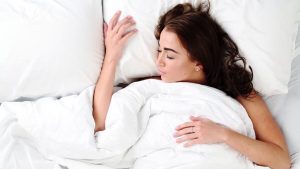
Image courtesy: www.pinterest.com
Less and less people nowadays feel rested after returning from vacation, according to a recent survey. Despite the mornings spent sleeping and the reduced pace, it is not that easy to get rid of the accumulated lack of sleep, especially if you encountered a shifting of clocks with daylight saving time coming into play. Even if the holidays are already over now, here are some tips for you to find your rhythm of life during your “off” days.
Catching up on sleep sadly isn’t a thing
In adults, a truly recharging night should last between 7 and 9 hours, depending on the person. But store your calculators right away: sleep is not a matter of addition and subtraction. If you have spent the last six months sleeping for five or six hours a night on a luxury adjustable bed like the Amerisleep, sleeping for three hours more per night during the week or during the two weeks of vacation that take place isn’t really going to be of any help. Such a change of pace also doesn’t go without some risk: called “social jet lag”, the method that consists in sleeping a lot during holidays or weekends and little time during the rest of the week has a negative impact on one’s mood and increases the risk of heart disease.
You can actually never catch up on missed sleep, since it is the deep sleep during which the growth hormone allows us to grow when we are small and to build when we are tall. If we do not sleep the first three hours of sleep in our usual hours, especially and precisely when we make this hormone, it is simply useless to sleep. Now this principle is the same whether you sleep on a good old platform bed or a modern adjustable bed like the Reverie 7S.
Use the holidays to find your rhythm

Image courtesy: www.pinterest.com
Holidays can not be used to fill a gap. Mainly because you might be having a lot of fun sailing or snorkeling if you want to try on your trip or trekking. However, your body would get tired and help you fall asleep much easier. They can help you find your rhythm, and determine how much sleep your body truly needs. Thus, on vacation, it is recommended to be particularly attentive to your body. As soon as you start yawning or feeling that your eyes are stinging, try to go to sleep whether it is on an RV mattress or a grand Prodigy Comfort Elite adjustable base. And in the morning, without using an alarm clock, try to get up as soon as you open your eyes for the first time. To avoid sleeping too much, you just have to get up in the morning, and associate to your morning a pleasant ritual (quiet breakfast, newspaper, listening to nature’s sounds…) Our biological clock programs our waking time on its own, and 30 minutes before, we start producing cortisol, the stress hormone, to accompany this awakening. If we go back to sleep, we will have a a harder time waking up!
If you have two weeks of vacation, this should be enough to rehabilitate your body: the first week you will sleep more than you need, then you will find your natural rhythm during the second. For shorter holidays, it is easier to keep a sleep pattern relatively close to the one you had during your activity period. In other words, regardless of whether your vacation was long or short, the benefits remain the same.
When you sleep well, your body is relaxed, and after your holidays are over, you’d be able to focus on your work even more. But, if you have had enough sleep, you can just lie down on your bed and rest for a while. For instance, you may watch Netflix or play games to calm your mind. You can also try doing yoga by watching yoga videos in the morning to heal your body and mind from the inside. But you must ensure that you have a reliable internet connection to watch the videos, or you’d very soon get over your yoga enthusiasm.
Anyway, you can enjoy your vacation to learn how to sleep earlier. For this, here are some tips:
- A physical activity can, though absolutely not if done at the end of the day, because that could then lead to the opposite effect.
- Avoid screens at least an hour before bedtime: the blue light of smartphones and computers is the worst enemy of sleep!
- In the evening, eat light (but eat anyway) to avoid excessive digestion.
- Adopt a calm, soothing breathing pattern, while visualizing pleasant images (a lake, a green landscape) to go from being awake and alert to feeling sleepy. Close your eyes, inhale calmly and deeply by inflating your belly like a balloon and then expire a long time through the mouth while tucking in your belly. After that, release all the muscles of the body, from the head to the toes until you feel like your body is becoming more and more heavy.
- Design your bedroom in such a way that you fall asleep even as you enter it!
Holidays, an opportunity for you to learn how to nap

Image courtesy: www.pinterest.com
As we have said above, it is during the three first hours of sleep that the night is the most relaxing. On vacation, it is advisable to get up early, even if you fell asleep very late, so as not to disturb your usual rhythm. And the best way not to feel the tiredness is to take a nap:
It is possible to use your holidays to learn how to take a nap. A study has been done on groups of healthy people who happen to be deprived of sleep.This sleep deprivation is accompanied by an increase in inflammatory factors and immune disorders, as well as an unusually high sensitivity to pain. It has been shown that a nap of twenty minutes would be more than sufficient to cancel these disturbances.
Be careful, however, that the nap does not exceed one hour and a half, so as not to be too perturbed either.
And what about children?

Image courtesy: www.pinterest.com
Most of the tips in this article are also valid for children…they are actually even more important when it comes to children! Children and teenagers need even more than adults to have a regular sleep, both during holidays and during school time. Before they reach the age of 6, children even need to sleep from 10 to 11 hours per night. If it is possible to afford some lazy times during the summer holidays (provided you put them back in the rhythm 15 days before the return to school), for the shorter holidays, it is advisable not to change anything at their usual rhythm.

